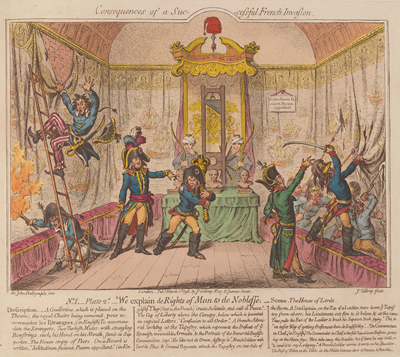Consequences of a Successful French Invasion, No 1. Plate 2nd
"We explain de Rights of Man to de Noblesse."
This is the second plate of what was intended to be a 20 plate series, described in a Pamphlet by Sir John Dalrymple and drawn and etched by Gillray, warning about the consequences of a French invasion. The scene for each plate was to be set in a different locale presumably to suggest how every facet of British life—political, economic, judicial, social, religious, and military—would be transformed by the invasion. Only four of the plates, however, were actually completed. For more information about the genesis, background, and other plates in the series, see my Introduction to the Consequences of a Successful French Invasion.
This plate, set in the House of Lords, purports to show the consequences of a French invasion upon the upper branch of Parliament. Like the first plate in the series, the subtitle here, "We explain de Rights of Man to de Noblesse." is once again terribly ironic. For the prominence of the guillotine and the Turks with their "strangling bowstrings" both suggest that the explanations are over, that the King and nobles have already been executed. As its placement in the chamber indicates, the guillotine has become King. And the places of highest honor are filled with the busts of assassins and would-be assassins of Kings and Lords. According to Wikipedia, Robert-François Damiens was a French domestic servant who tried to kill the French King Louis XV. Francois Ravaillac was a French Catholic zealot who successfully assassinated another, earlier French King, Henry IV. And John Felton was a lieutenant in the English Army who stabbed to death the nobleman, George Villiers, 1st Duke of Buckingham.

"We explain de Rights of Man to de Noblesse." [March 1, 1798]
© Beinecke Rare Book and Manuscript Library, Yale University
On the back wall is a sign that carries on this theme of emptying the House of Lords: "solitudinem faciunt, pacem appellant." The words are part of a famous quotation from Tacitus' Agricola about another invasion and conquest of Britain—this time by the Romans. The words are part of a speech by Calgacus, a Caledonian chief, before the Battle of Mons Graupius, where he was describing the effect of Rome's conquests: "Auferre, trucidare, rapere, falsis nominibus imperium; atque, ubi solitudinem faciunt, pacem appellant." The Loeb Classical Library provides the most appropriate translation of the Latin words in this context:
They plunder, they slaughter, and they steal: this they falsely name Empire, and where they make a wasteland, they call it peace.
We have seen the peace achieved in the house of Lords by slaughter and waste. The plundering and stealing are shown in the print in the wanton destruction of the famous Spanish Armada tapestries then hanging in the House of Lords and by the theft of the ceremonial mace. As described by Dalrymple in the text accompanying the print, both are individual decisions based on nothing more than the impulse for self-aggrandizement. The French Admiral orders the slashing and burning of the tapestries because they depict the defeat of an armada not unlike his own: "Me like not de Omen; destroy it." And the mace is stolen at the behest of the Commander in Chief who says, "Here, take away this bauble; but if there be any Gold on it, send it to my lodging."
Both these actions, Gillray and Dalrymple would claim, are symptomatic of a world where deference and hiearchy have been displaced by the foolish pursuit of "Liberté." Hence the bonnet rouge above the canopy is also the cap and bells of a fool. And as the inscription on the canopy suggests, this form of liberty results in a "Confusion to All Order." So, it is not surprising that even within the ranks of the soldiers destroying the House of Lords, there is the beginning of insurrection. As described by Dalrymple in the text accompanying the print, while a
Sea Captain, on the Top of a ladder, tears down the Tapestry. . . his Lieutenant sets fire to it below, and at the same Time pulls the foot of the Ladder to break his Superior's Neck; saying 'This is an easier Way of getting Preferment than de English Way.'
Sources and Reading
- Commentary from the British Museum on the Consequences of a Successful French Invasion, No 1. Plate 2nd.
- Draper Hill, Mr. Gillray The Caricaturist, 1965, Chapter 7: A Patriotic Venture.
- "Sir John Dalrymple, 4th Baronet," Wikipedia
- Consequences of the French Invasion, a Pamphlet by Sir John Dalrymple
- "Tacitus" Wikiquote
- "François Ravaillac" Wikipedia
- "Robert-François Damiens" Wikipedia
- "John Felton (assassin)" Wikipedia
- Thomas Wright and R.H. Evans, Historical and Descriptive Account of the Caricatures of James Gillray #179
- Thomas Wright and Joseph Grego, The Works of James Gillray, the Caricaturist; With the History of His Life and Times p. 236
Comments & Corrections
NOTE: Comments and/or corrections are always appreciated. To make that easier, I have included a form below that you can use. I promise never to share any of the info provided without your express permission.